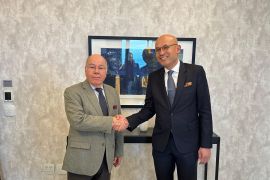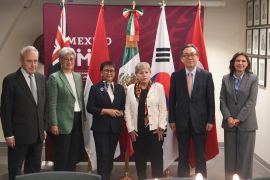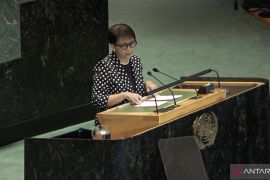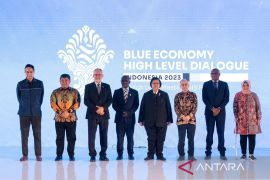These commemorative events, which began on April 19, will be held till April 24 in Jakarta and Bandung.
"Indonesia should lead Asian and African countries to reinforce the multilateral system of global governance," an expert of international relations Makarim Wibisono said.
Wibisono, who is also a special rapporteur of the United Nations (UN) on human rights in Palestine, added that global governance was not being carried out well currently.
The unfavorable condition of global governance was reflected in the failure of the UN in overcoming various issues and developments that have become the focus of the worlds attention, such as the Islamic State of Iraq and Syria (ISIS), Boko Haram in Nigeria, and the Crimea conflict in Ukraine.
"The United Nations has neither been able to overcome the ISIS issue, nor resolve the Boko Haram case and the Ukrainian separatist conflict," Wibisono remarked.
In this case, the role of Indonesia in utilizing the 60th anniversary events of the AAC is crucial to encourage Asian and African nations to strive to strengthen the multilateral system.
If the multilateral system, or global governance, is not set on the right track soon, it is feared that the world may face a significant risk ahead.
"If global governance is not strengthened posthaste, it is feared that a strong and advanced nation will turn it into a unilateral scenario or even take unilateral military steps to resolve the problems, as a result of which other countries could become victims of their actions," Wibosono explained.
Besides encouraging Asian and African countries to play active roles in improving the multilateral system, Indonesia also needs to lead these nations to implement a concept they already agreed upon together a decade ago in the form of the New Asian-African Strategic Partnership (NAASP).
The NAASP was agreed upon during the 50th anniversary of the AAC in 2005.
Wibisono pointed out that at the beginning, the AAC had three committees, one each on politics, economy and culture. However, it was only the committee on politics, which produced the Dasasila Bandung (the Ten Principles of Bandung), that consistently produced concrete results and had impacts.
"The political committee produced the Dasasila Bandung, and has a history of being beneficial and influential, including by giving birth to the Non-Aligned Movement. It has also become a reference for member countries of the UN while coming to a consensus," he stated.
Furthermore, the products of the Committee on Economy and the Committee on Culture are not well implemented. The AAC now has the comprehensive NAASP, for which Indonesia should work hard to ensure its success.
With regard to the strategic partnerships and the right model for its implementation, President Joko Widodo said in an exclusive interview on Monday that it will be discussed in a conference.
"We will discuss it in a conference tomorrow. We do not want to get ahead of ourselves. However, as it involves all countries, we must all talk about what we really want first. I think Indonesia needs to build the courage to speak up and to present the message as a large country and the worlds largest Muslim-populated nation. But, once again, holding a dialog must be prioritized," the president said.
The most important factor for Indonesia, he added, was regional stability, both political as well as in terms of security, as these will boost the economic growth of the country and help to promote both regional and global economic growth. Security and political stability in a country are important for stability in an entire region. Without them, we cannot achieve good economic growth.
Moreover, according to Indonesian Foreign Affairs Minister Retno Marsudi, the comprehensive NAASP framework will make cooperation among countries of the two continents more closely structured.
"I believe that the comprehensive New Asian-African Strategic Partnership framework will open a new chapter in cooperation among Asian and African countries," Marsudi said during her opening speech at the Asian-African Ministerial Meeting on Monday.
The minister pointed out that the comprehensive framework will open a new window of opportunities for Asian and African countries, as well as build a bridge between countries of the two continents.
"The NAASP framework includes operational mechanisms, which describe the full cooperation required among Asian and African countries to ensure its implementation," she added.
In addition, Marsudi noted that the outline provides a practical approach that does not depend on the area of cooperation alone but on current priorities, as well.
With regard to cooperation among countries of the two continents, she stated that Indonesia will promote cooperation in maritime connectivity.
"The sea separates our continents. Indonesia will promote cooperation in maritime connectivity to shorten the distance between Asia and Africa," she affirmed.
Now, as it is hosting the 60th anniversary of the AAC, Indonesia has become the focus of the worlds attention.
Associate Director of Paramadina Graduate School Abdul Malik Gismar said that the world now looked to Indonesia.
Now, the people of Asia and Africa, and even the world, look to Indonesia to play a greater role to resolve international problems, Gismar remarked.
"With several countries beset by poverty in Asia and Africa not being able to speak for themselves, they hope for a leading voice. They want Indonesia to speak on their behalf again," he pointed out.
Therefore, the Asian-African commemorative conference of 2015 offers an opportunity for Indonesia to assume leadership over the Third World to challenge the hegemony of the West and over the reinforcement of global governance.
(A014/INE/B003)
EDITED BY INE
(A014/KR-BSR/B003)
Reporter: Andi Abdusalam
Editor: Jafar M Sidik
Copyright © ANTARA 2015











